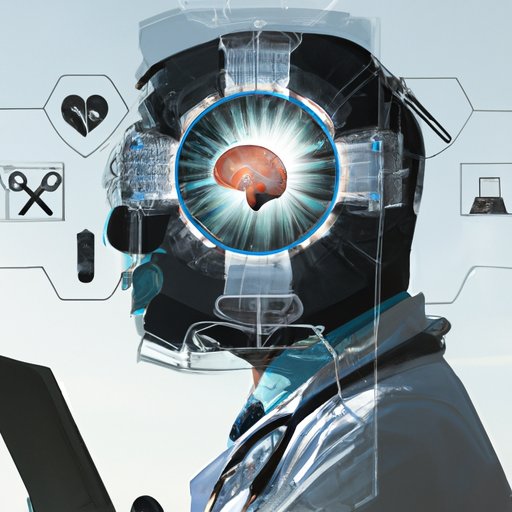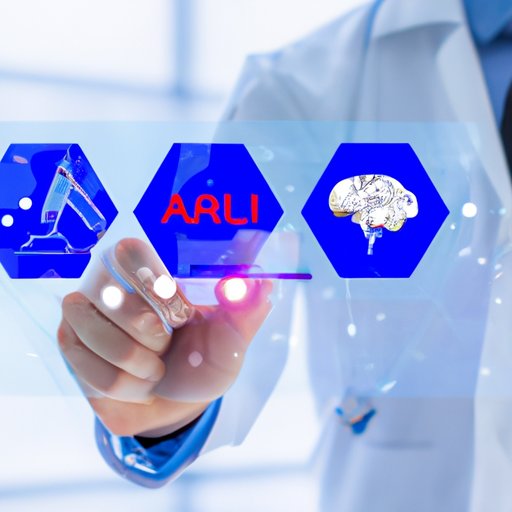Introduction
Artificial intelligence (AI) has become an increasingly important tool for improving healthcare outcomes around the world. From automated medical practices to improved diagnosis and treatment, AI is transforming the way healthcare professionals interact with patients, providing new opportunities for better care. In this article, we will explore the impact of AI on healthcare, examining both the potential benefits and challenges posed by this technology.
Examining the Potential of AI in Healthcare
AI has the potential to revolutionize the healthcare industry, providing more efficient and effective treatments for patients. Here are some of the ways that AI is already being used in healthcare:
Automation in Medical Practices
AI is being used to automate many of the mundane tasks that take up a considerable amount of time for healthcare professionals. For example, AI can be used to automatically schedule patient appointments, process insurance claims, and even order medical supplies. According to a study by Accenture, automation could save the US healthcare system up to $150 billion per year.
Improved Diagnosis and Treatment
AI is also being used to improve diagnosis and treatment. By analyzing large amounts of data, AI can identify patterns and make recommendations for diagnosis and treatment. For example, AI can be used to identify diseases such as cancer at an early stage, allowing doctors to provide more effective treatments. AI can also help to reduce errors in diagnosis, which can lead to improved outcomes for patients.
Enhancing Care Quality
AI can also be used to enhance the quality of care provided to patients. For example, AI can be used to monitor vital signs, such as heart rate and blood pressure, and alert clinicians if there are any abnormalities. AI can also be used to collect and analyze data to identify potential trends in healthcare, which can then be used to improve patient outcomes.

Exploring the Impact of AI on Medical Diagnosis
One of the most significant impacts of AI on healthcare is in the field of medical diagnosis. Here are some of the ways that AI is being used for medical diagnosis:
Automated Disease Diagnosis
AI can be used to automate the process of diagnosing diseases, reducing the amount of time it takes to reach a diagnosis. For example, AI algorithms can be used to analyze medical images, such as x-rays and CT scans, to identify potential diseases. AI can also be used to analyze lab results and other data to help diagnose diseases.
AI-Assisted Imaging Analysis
AI can also be used to assist in the analysis of medical images. AI algorithms can be trained to recognize patterns in images, such as tumors or other abnormalities, and alert clinicians to potential problems. This can help to reduce the amount of time it takes to diagnose diseases, leading to improved outcomes for patients.
Assisting Pathologists
AI can also be used to assist pathologists in diagnosing diseases. AI algorithms can be trained to recognize patterns in tissue samples, such as cancerous cells, and alert pathologists to potential issues. This can help to reduce the amount of time it takes to reach a diagnosis, leading to improved outcomes for patients.
Analyzing the Benefits of AI for Patient Care
AI has the potential to improve patient care in a variety of ways. Here are some of the potential benefits of AI for patient care:
Streamlining Administrative Tasks
AI can be used to streamline administrative tasks, such as scheduling appointments, processing insurance claims, and ordering medical supplies. This can free up time for healthcare professionals, allowing them to focus on providing care to patients. According to a study by Accenture, AI can save the US healthcare system up to $150 billion per year.
Personalized Medicine
AI can also be used to provide personalized medicine, tailoring treatments to individual patients based on their unique needs. AI algorithms can be used to analyze a patient’s medical history, lifestyle, and other factors to provide more personalized care. This can lead to improved outcomes for patients.
Improved Access to Healthcare
AI can also be used to improve access to healthcare, particularly in rural and underserved areas. For example, AI-powered chatbots can be used to provide basic health information to patients, helping them to make informed decisions about their care. AI can also be used to connect patients to remote healthcare professionals, allowing them to receive care without having to travel long distances.

Assessing the Challenges Posed by AI in Healthcare
While AI offers many potential benefits for healthcare, there are also a number of challenges that must be addressed. Here are some of the challenges posed by AI in healthcare:
Cost Implications
One of the major challenges posed by AI in healthcare is the cost implications. AI systems require significant investments in hardware, software, and personnel, which can be difficult for healthcare organizations to manage. Additionally, AI systems can be expensive to maintain and update, adding to the overall costs.
Data Security
Another challenge posed by AI in healthcare is the need for secure data storage. AI systems rely on large amounts of data, which must be stored securely to protect patient privacy. Ensuring the security of patient data is a major challenge for healthcare organizations.
Ethical Considerations
Finally, there are ethical considerations when using AI in healthcare. AI systems can be biased and make decisions that are not in the best interests of patients. Healthcare organizations must ensure that AI systems are designed and implemented responsibly to avoid potential ethical issues.

Evaluating the Use of AI in Healthcare Research
AI is also being used in healthcare research, offering the potential to improve the efficiency and accuracy of clinical trials. Here are some of the ways that AI is being used in healthcare research:
AI-Powered Clinical Trials
AI can be used to power clinical trials, analyzing large amounts of data to identify patterns and correlations. AI can be used to identify potential treatments for diseases, allowing researchers to quickly test and evaluate new treatments.
Increasing Efficiency in Clinical Research
AI can also be used to increase the efficiency of clinical research. AI algorithms can be used to automate mundane tasks, such as data entry, freeing up time for researchers to focus on more important tasks. AI can also be used to analyze large amounts of data more quickly, allowing researchers to reach conclusions more quickly.
AI-Driven Drug Discovery
Finally, AI can be used to drive drug discovery. AI algorithms can be used to identify potential drugs and evaluate their effectiveness, allowing researchers to develop new treatments more quickly. This can lead to improved outcomes for patients.
Conclusion
AI has the potential to revolutionize the healthcare industry, providing more efficient and effective treatments for patients. From automated medical practices to improved diagnosis and treatment, AI is transforming the way healthcare professionals interact with patients, providing new opportunities for better care. AI can also be used to improve patient care, streamline administrative tasks, and increase the efficiency of healthcare research. However, there are also a number of challenges posed by AI in healthcare, such as cost implications, data security, and ethical considerations. Going forward, it is critical that healthcare organizations continue to invest in AI technology to unlock its full potential.
(Note: Is this article not meeting your expectations? Do you have knowledge or insights to share? Unlock new opportunities and expand your reach by joining our authors team. Click Registration to join us and share your expertise with our readers.)
